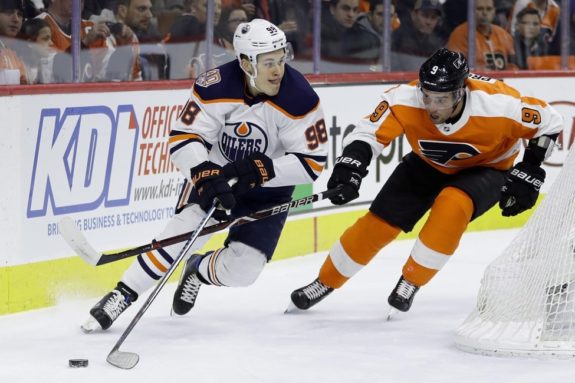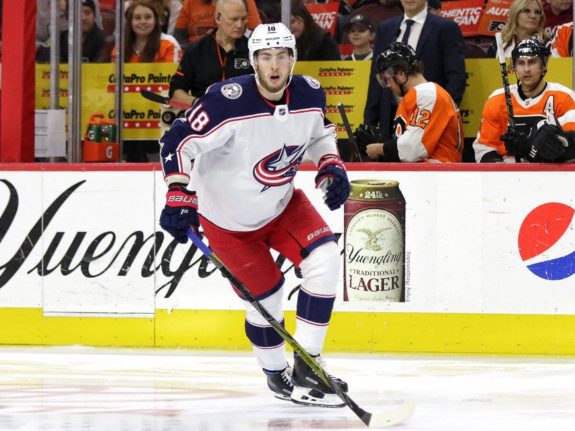Columbus Blue Jackets general manager Jarmo Kekalainen raised some eyebrows when he selected center Pierre-Luc Dubois No. 3 overall at the 2016 NHL Entry Draft. In retrospect, he shouldn’t have. It was the right decision.
Dubois Over Puljujarvi
It isn’t just that a winger, Finn Jesse Puljujarvi, who fell to the Edmonton Oilers at No. 4, had been the consensus third pick in the draft. Under normal circumstances, drafting a center over a winger makes a lot of sense.

So, even if there had been some disparity between the two prospects, the Dubois selection was justifiable even then. It should be noted that disparity has since shifted the other way due to Puljujarvi’s failure to so much as establish himself as an NHL player.
Johansen-Jones Trade Revisited
Another reason the pick made sense? Kekalainen had just traded away star center Ryan Johansen to the Nashville Predators for Seth Jones at the start of the calendar year. That’s another move that, although initially a fair one-for-one deal, has since tilted heavily in the Blue Jackets’ favor. It nevertheless left a hole in the middle of the line-up, with Boone Jenner (49 points), Brandon Dubinsky (48) and Alexander Wennberg (40) remaining the top-scoring centers on that specific team.

Each has since regressed badly from a production standpoint, to the point that neither Jenner nor Wennberg hit so much as 30 points this past season with the Blue Jackets. Dubinsky remains out with a chronic wrist injury, last playing in 2018-19, when he scored a meager 14 points in 61 games.
Granted, the Blue Jackets also had a 23-year-old William Karlsson on the team at the time of the trade. However, no one really knew what they had in the eventual 40-goal scorer, seeing as he was for all intents and purposes pushed on the Vegas Golden Knights in the 2017 NHL Expansion Draft. The Blue Jackets reportedly traded the Knights first and second-round picks in exchange for taking on David Clarkson’s contract, selecting Karlsson and not selecting the unprotected Joonas Korpisalo or Josh Anderson.
In hindsight, Karlsson deserved to be protected. However, that he was on the team to begin with shows how much of a good trade the Jones-Johansen deal turned out to be for the Blue Jackets. Jones has since developed into a James Norris Memorial Trophy-caliber defenseman, while Johansen’s tenure with the Predators has had its share of downs. He remains a 60-point player, but has far from hit the 30-goal plateau (or even 20 goals) that he reached in 2013-14 again. That’s why Johansen’s ensuing contract stand-off with Kekalainen that 2014 offseason is so relevant here.
Dubois vs. Johansen
Just like Johansen in 2014, Dubois is set to hit restricted free agency once his entry-level contract expires at the end of this season (whenever that will be). Back then, Johansen had been seeking around $6.5 million per season. The Blue Jackets had been willing to pay him around $3.5 million per season as part of a two-year bridge deal, which is a big difference.
Even though the two sides ultimately signed a three-year, $12 million deal, the dispute led to Johansen effectively missing training camp. Only three days remained between the point at which the deal was signed and the Blue Jackets opened their season against the Buffalo Sabres.

To his credit, Johansen didn’t let the late start stop him. He stormed out of the starting gates with a 10-game point streak (five goals, eight assists). He even set a new career-high 71 points (26 goals). So, all in all, it seemed as though the Blue Jackets had come out as big winners. No one knew just how much at the time.
Simply put, while far from a bust, Johansen has been a disappointment, especially since he signed his latest contract, an eight-year, $64 million deal, in 2017. Johansen himself has admitted as much, with his ice time declining from 17:56 per game to 15:43 under new head coach John Hynes.
Jackets and Kekalainen Were Right
Maybe Kekalainen had legitimately been concerned about giving a young player like Johansen too much too soon. Maybe they saw a lack of something in him everyone else refused to at the time, because, let’s be honest, after a 21-year-old scores 33 goals and 63 points like Johansen did in 2013-14, the knee-jerk reaction in this day and age is to lock him up long term.
Almost everyone (if not everyone outright) on the outside looking in thought it: Why not just give Johansen the money? Kekalainen and the Blue Jackets knew better, though. In fact, that’s why they’re in such a great position ahead of negotiations with Dubois.

Coming off a 27-goal, 61-point season in 2018-19, Dubois may be a star in the making. However, Kekalainen has already set the precedent that no player, especially a young one just finishing his first contract with a lot to prove, is bigger than the team. That philosophy is reflected in the Jackets’ pay structure, with Cam Atkinson owning the highest cap hit on the team at a mere $5.875 million.
It’s seen in how they signed starter Elvis Merzlikins to a modest two-year extension, after which he’ll be an unrestricted free agent. Whether that turns out to be a mistake or not, you have to believe Kekalainen is aware of the risks and it’s all done by design.
Dubois Negotiations Destined to Be Do-Over
Simply put, the Dubois negotiations are destined to be a do-over of the Johansen situation. There’s no avoiding it. There’s also no reason the Blue Jackets should want to do anything differently. For starters, with the departure of Artemi Panarin, the Blue Jackets’ offense as a whole took a hit, with Dubois’ production falling to 18 goals and 49 points in 70 games this past season.
So, right off the bat, Dubois, even in leading the team in scoring like Johansen did in 2014, doesn’t have the same leg on which to stand. Furthermore, we all know it didn’t even work out for Johansen in negotiations six years ago.
That’s in part the main point. Kekalainen and the Blue Jackets have been wholly vindicated with regard to how they handled Johansen. There’s close to no chance they diverge from the game plan at this stage, considering they’re arguably on the verge of becoming perennial threats with a franchise-record four straight playoff appearances (assuming you count their play-in round berth this season as one).

Dubois is undeniably a part of the master plan. That shouldn’t be in doubt at this stage, considering his quasi-off-the-board selection in 2016 or his play up to this point. However, neither should the fact that there is a master plan. There clearly is one at work. More than that, for better or worse, Kekalainen’s pulling the strings. You can probably expect them to raise a few more eyebrows from here on out as a result, but their eyes clearly won’t be on the same bigger picture his are.